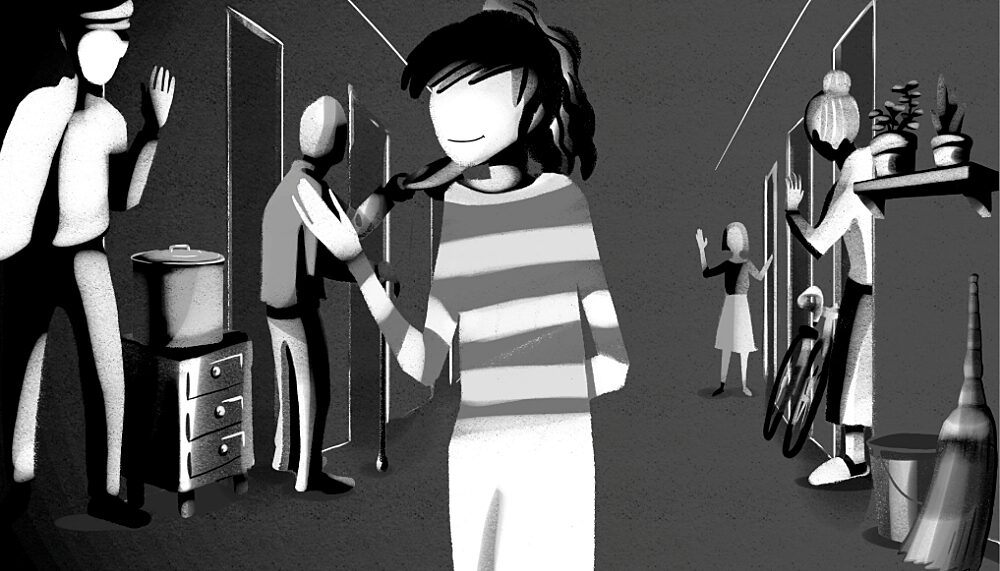STORY
Healing grievances across generations after the Georgian-Abkhaz conflict
Watch Tatuli Beraia's story

The Berghof Foundation has been organising dialogues with people from Georgia and Abkhazia since 2014 aimed at fostering empathy between them and breaking the cycle of intergenerational trauma. Tatuli Beraia, a participant in our programme, highlights the crucial role of dialogue in addressing the deep psychological scars left by conflict.
Read her story or watch the video below.
Born in 1990, in Gulripshi, Abkhazia, Tatuli’s early life was deeply affected by the Georgian-Abkhaz conflict. After Georgia gained independence from the Soviet Union, many Abkhazians pursued their own state. The war that ensued in the summer of 1992 was fought entirely in Abkhazia and claimed around 10,000 lives, including numerous civilians on both sides. Nearly all Georgians and other ethnic groups fled Abkhazia, and also Tatuli and her family, who are ethnically Georgians, had to leave her childhood home. "I was so small—two, two and a half. My father fought in Sukhumi [on the Georgian side]. We left him there. Mama, her cousin, and I escaped on a steamer”, Tatuli tells us.
They relocated to a hostel originally built for Olympic reservists in Georgia where she lived until she was 20. "It was a building with [many] rooms along a [long] corridor; we all lived like one big family. But I developed a complex. I didn’t want to invite my friends, so as to stop them knowing the conditions in which I lived."
After conflicts end, transgenerational trauma often hinders meaningful dialogue about rebuilding relationships within a society or establishing lasting peace. The challenge of confronting a violent past spans generations and is filled with obstacles. In many countries or regions, the enduring state of conflicts is preserved within family histories, marked by deep wounds and a persistent mistrust of the “other side”. As a result, younger generations, who have not directly experienced the conflict, frequently inherit the traumas of their parents.
At school, for example, Tatuli’s best friend was Abkhazian and they became friends right away. But many were surprised about their friendship since Tatuli was Georgian while her friend was from the ethnic group blamed for the conflict that forced her family to leave their home. “My mother wasn’t happy about it and didn’t want to sit next to my friend’s mother on excursions.", says Tatuli.
Her father, an ex-combatant, carried deep psychological trauma from the war: "Every night before going to sleep, he walks himself in his mind through the streets of Sukhumi so as not to forget. If he can’t remember which alley comes after this or that street, he gets stressed and upset." With her family’s background and the grievances they carry, Tatuli was at danger of inheriting biases and trauma from her parents and elders.
In families who had lived through the war, there’s a great danger that because of the conversations taking place, children can grow up in hatred and enmity, with stereotypes. I’m very happy that I was able to overcome that danger, but it wasn’t easy.
Tatuli Beraia
Tatuli took part in our History Dialogue process, in which Abkhaz and Georgian people listened to and discussed stories of the war from both sides. The goal of the dialogue was to develop empathy for each other to build a peaceful future together. Among the many stories Tatuli heard, one that particularly resonated with her was that of Guli, an Abkhazian mother who lost her son in the conflict. Despite her profound loss, she demonstrated the strength to sit down with another person who has also suffered and lost loved ones, serving as a powerful example of reconciliation.
Tatuli realised that true heroism lies in the strength to embrace humanity after the horrors of war. "I [think] that Guli’s son would be very proud of what his mother is doing,” she said after the workshop.
Over the past five years alone, our team organised over 4,000 workshops with participants from all walks of life in Georgia and Abkhazia. We reached over 49,000 people who were open to exchange about the country's past and deal with their trauma.
The transformative stories shared at these workshops by the facilitators, the participants, and many supporters who were involved in the process, played a crucial role in helping young people like Tatuli to break the cycle of transgenerational trauma. Their stories of personal transformation reveal how mutual understanding and healing grievances can pave the way for a future where dialogue and peace are not merely aspirations but lived realities.
This article was updated on 12 September 2024 to fix some typos.
Your support helps us do more
So much money is spent on war. It’s time to invest in peace. Your donation enables us to sustain and expand our work.


